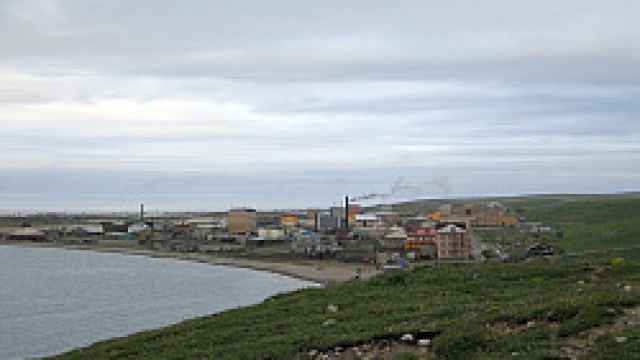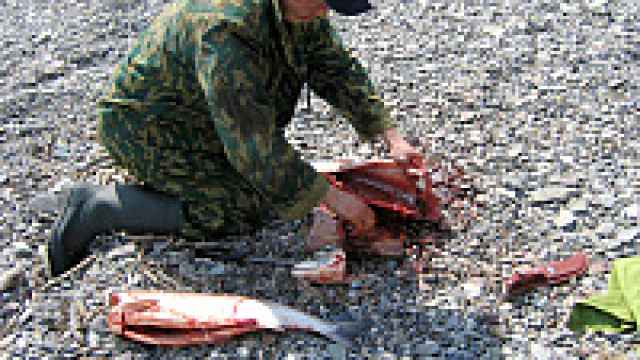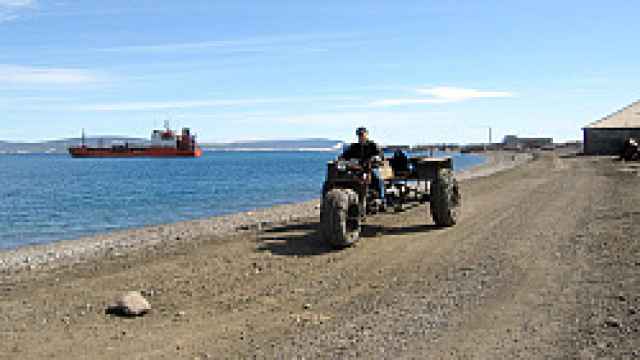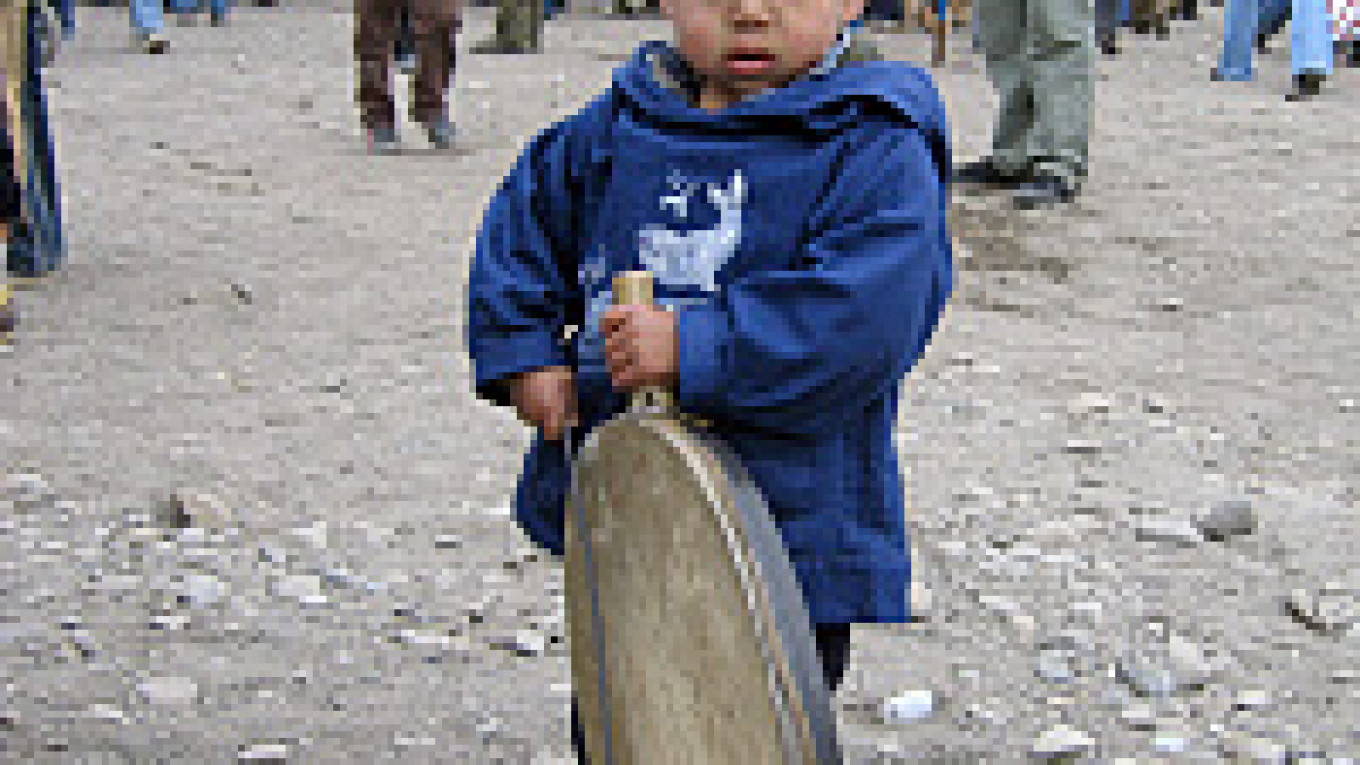LAVRENTIA, Chukotka Region -- Unbeknown to most of the world, the residents of Chukotka are deeply worried. They wonder what will happen when their much-adored governor, Roman Abramovich, leaves for good.
Few in Chukotka expect Abramovich to stay until 2009, when his current term expires. Even fewer think the region will be able to survive without him and his money.
"It used to be a complete mess here, and now it's all different," said Oleg Dobriyev, 45, a resident of Lavrentia, the main settlement in Chukotka's Chukotsky district and Russia's eastern-most municipality.
"Before, we would not see a tanker with crude or gasoline until about November. Now, tankers always come on time -- in the summer," he said on a recent evening in his new apartment, built by a Turkish firm and paid for by Abramovich's administration.
Dobriyev, who is three-quarters Eskimo and one-quarter Ingush as a result of Russia's 20th-century turmoil, works at Chukotsnab, a Chukotka administration-controlled enterprise in charge of food, goods and fuel supplies to the region. Earlier that day, he had busily pumped gasoline out of a 5,000-ton tanker that brought enough fuel to last until next summer.
Even though the settlement -- trapped between hilly tundra and Lavrentia Bay and home to 1,600 residents, 80 percent of them native peoples -- has enough fuel to survive the windy and bitter cold winter, Dobriyev is not completely happy.
It is the future that worries him and the some 50,600 other inhabitants of Chukotka, roughly twice the size of Germany. "Don't even ask me what is going happen if he goes," Dobriyev said, wagging his head with concern.
Best known in the West as Russia's richest man and for spending hundreds of millions of dollars on extravaganzas like football players and yachts, Abramovich, 39, is the face of Russia's young and wild capitalism. In Chukotka, however, he is seen as nothing short of a savior.
It has been seven years since Abramovich first began helping the remote and impoverished region on the Pacific coast.
In 1999 he successfully ran for a seat representing Chukotka in the State Duma, and in 2001 he won the region's gubernatorial election.
Abramovich has not disclosed his personal reasons for getting involved in Chukotka. Observers have suggested that he might have struck a deal with the Kremlin to govern and essentially feed Chukotka in exchange for a guarantee that the state would not touch his wealth.
The price for any such deal, however, has not been small: Abramovich has poured hundreds of millions of dollars of his personal wealth into the region.
 Valeria Korchagina / MT A view of Lavrentia, a settlement of 1,600 people trapped between hilly tundra and Lavrentia Bay. Chukotka residents feel they have more at stake in the 2008 vote than the rest of the country. | |
An Abramovich spokesman said the governor, who lives in London, would not comment for this report.
President Vladimir Putin appointed Abramovich to serve a second four-year term last year, but few in Chukotka think he will stay until it ends, and they fear that when he leaves, the region will sink into the same sort of appalling disrepair it suffered in the late 1990s.
Within the Chukotka administration -- where all key posts are held by people imported by Abramovich from his businesses and other regions -- the mood is also tense. Officials are struggling to figure out how to leave the region without ruining everything they have accomplished.
The worries are well founded. Abramovich's departure would mean that a lion's share of the funds that have kept the region afloat in recent years would disappear.
 Valeria Korchagina / MT A fisherman cutting open his catch near Anadyr, the capital of Chukotka. | |
Taxes paid by Sibneft, which Abramovich registered in Chukotka, covered nearly half of the region's annual budget of 13.5 billion rubles last year. But Abramovich sold the oil company to Gazprom, and it has since been re-registered in St. Petersburg, leaving a gapping hole in the budget this year and for years to come.
"Because taxpayers like Sibneft and Slavneft have been moved from the region, our budget is now quite shaky," Chukotka Deputy Governor Mikhail Sobolev, a retired KGB officer and former Sibneft executive, told a group of journalists.
Chukotka's previously press-shy leadership flew in a half-dozen reporters for a media tour apparently aimed at drawing attention to the fact they would not be around forever -- a message they seemed to be trying to get across to the federal government.
The federal government has yet to agree to come up with a way to compensate for the tax revenues lost by the region through Sibneft's relocation.
 Valeria Korchagina / MT A man riding on near Lavrentia Bay. Behind him is the 5,000-ton fuel tanker. | |
"When we talk about the flow of nonbudgetary funds or the current administration, it is clear that nobody is going anywhere until 2008," Sobolev said, referring to the year that Putin's second presidential term ends, long a milestone on the country's political calendar.
Chukotka residents feel they have more at stake in 2008 than the rest of the country. Not only will they get to watch the transfer of power play out, but also they could see their lives take a turn for the worse if no alternative to Abramovich's deep pockets is found.
The 6 billion rubles that Abramovich pours into the region each year come via a charity vehicle called Territories' Fund, in which Abramovich is the key trustee.
And what does the federal government think about the possible disappearance of such a major funding source as the Territories' Fund?
"I don't think they even know it exists," Sobolev said bitterly.
Editor's Note: Part 2 will examine Chukotka's economy.
A Message from The Moscow Times:
Dear readers,
We are facing unprecedented challenges. Russia's Prosecutor General's Office has designated The Moscow Times as an "undesirable" organization, criminalizing our work and putting our staff at risk of prosecution. This follows our earlier unjust labeling as a "foreign agent."
These actions are direct attempts to silence independent journalism in Russia. The authorities claim our work "discredits the decisions of the Russian leadership." We see things differently: we strive to provide accurate, unbiased reporting on Russia.
We, the journalists of The Moscow Times, refuse to be silenced. But to continue our work, we need your help.
Your support, no matter how small, makes a world of difference. If you can, please support us monthly starting from just $2. It's quick to set up, and every contribution makes a significant impact.
By supporting The Moscow Times, you're defending open, independent journalism in the face of repression. Thank you for standing with us.
Remind me later.


